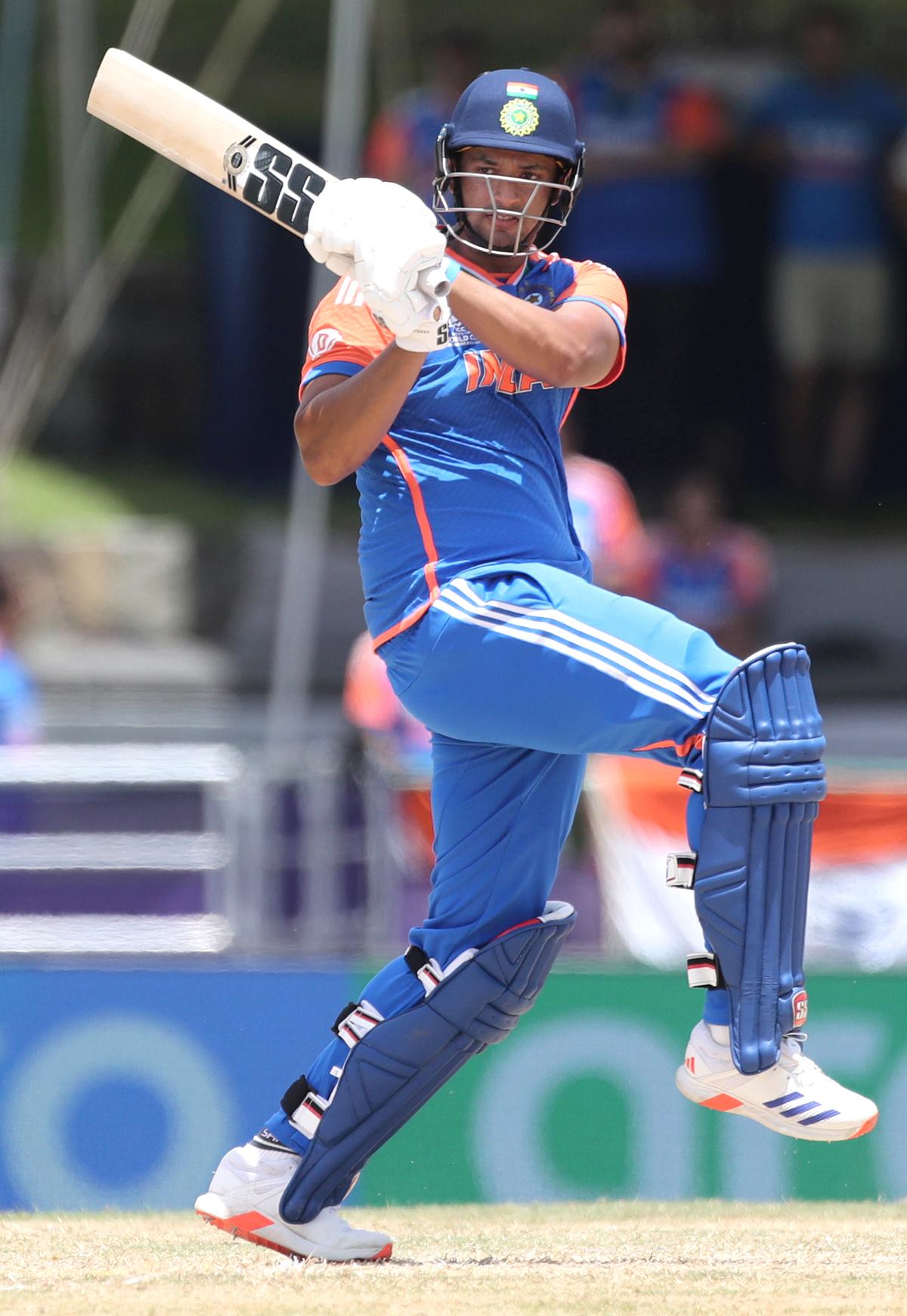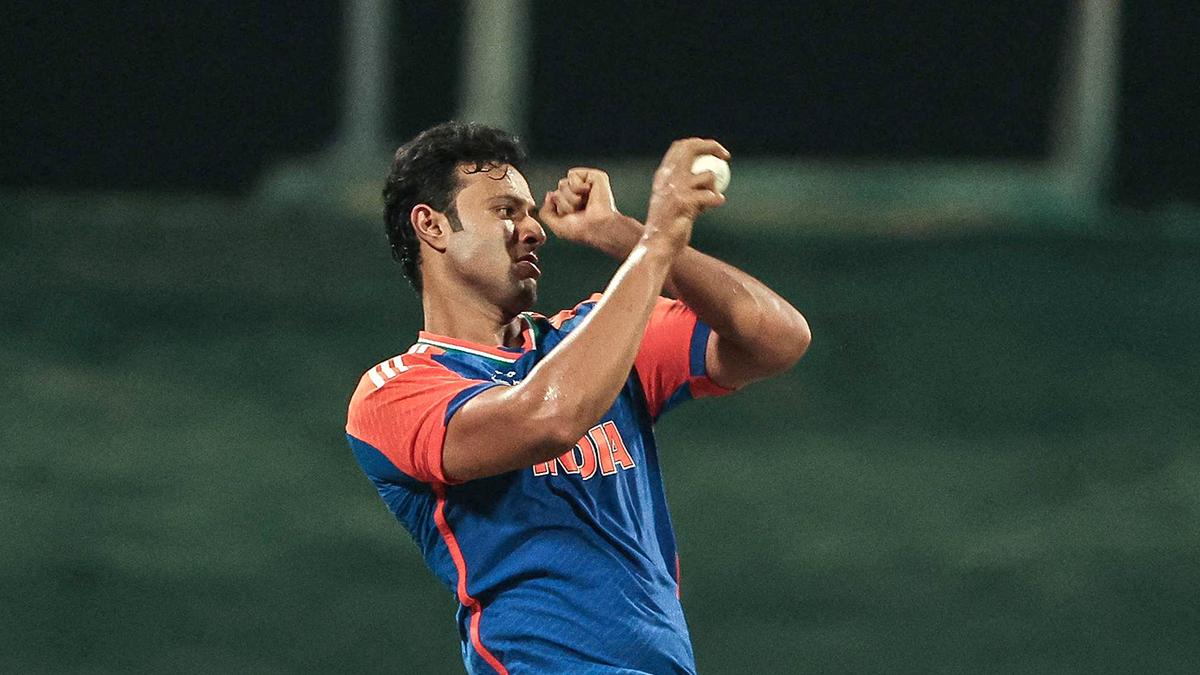Republic Day, 2020, marked the day Shivam Dube turned 27. It was the day India took on New Zealand at Auckland’s Eden Park in the second of five Twenty20 Internationals. Sitting on a 1-0 lead and needing just eight off 21 deliveries, Virat Kohli injected Dube at No. 5, perhaps as a birthday gift. The powerful left-hander finished off the game with a flat nonchalant pull off Tim Southee that sailed into the second tier beyond long-on.
That evening, Ravi Shastri, the head coach, couldn’t stop gushing. K.L. Rahul anchored the modest chase of 133 with an unbeaten 57, Shreyas Iyer toyed with the Kiwis in making 44, off just 33. Dube finished eight not out, hardly worth a second glance, but the exuberant Shastri couldn’t contain himself.
“Kya shot tha,” he thundered, typically boisterous. “Shades of Yuvi, boss, shades of Yuvi.”
Perhaps there were, perhaps there weren’t, but it seemed as if, having grabbed the imagination of the boss, Dube was here to stay. But not for long, as it turned out.
Three matches on, at the conclusion of an unprecedented 5-0 rout of New Zealand on their own patch, Dube was put out to pasture. After scores of 3, 12 and 5 in the remaining outings on that Kiwi sojourn, he didn’t play for the country until August 2023, for a second XI in Dublin. Three and a half years is a long time in sport, especially for a 27-year-old, but Dube used that period to reinvent himself, with no little help from Chennai Super Kings.
Consummate six-hitter
Dressed in the yellow of the five-time IPL champions, Dube found his calling in the middle-order as a slayer of spin. As the destroyer of egos and reputations, as the consummate six-hitter to whom the length of the boundary didn’t matter.
Every stroke he unleashed brought him closer to a long stint with the national team; for two successive IPL seasons, he made such a telling impact that by the time of the T20 World Cup in the USA and the Caribbean last year, he was a certainty not just in the extended 15-man squad, but in the playing XI too.
Dube has earned his spurs as a finisher; 28 T20I innings have brought him 546 runs at a strike-rate of 138.57, 10 not outs have boosted his average to 30.33. Impressive as these numbers are, they are still shaded by his career 20-over figures – average 31.06, strike-rate 141.95 in 173 matches and 154 innings. In the numbers where he bats, often between 4 and 7, these are terrific returns.

It’s primarily by taking down the bowling, and especially spin, that Dube has made a name for himself but now, his journey of rediscovery has transformed him into a useful, if not indispensable, cog of the Indian bowling wheel too. Dube isn’t so much a reluctant bowler as he is used sparingly; he has sent down only 339 deliveries in 39 T20Is, roughly an over and a half per match. Just thrice has he been required to complete his full complement of four overs though interestingly, two of those instances have come in the last 14 months. Today, he isn’t viewed as just one of India’s several middle-order floaters; he is also a back-up medium-pacer, a handy asset to possess when the team goes in with just one specialist quick alongside all-rounder Hardik Pandya in conditions the management group believes assist the spinners.
Consummate six-hitter
Dube is a strong lad, strapping and well built. He is a ponderous mover on the cricket field, patrolling the outfield gingerly and sometimes giving the impression that he is a physical half-step behind the ball, behind the game. As early as in the second over of Pakistan’s innings on Sunday at the Dubai International Cricket Stadium, Dube the fielder was called into action, and he didn’t exactly measure up to scratch.
India had made a poor start, Abhishek Sharma putting down Sahibzada Farhan off the third ball without a run on the board. It wasn’t a sitter, but it wasn’t the most challenging of catches either. Abhishek was a little late in reacting, and it seemed as if that was becoming infectious.
Dube took a fraction longer than normal to respond to a whip by Fakhar Zaman off Jasprit Bumrah; as he lumbered towards the ball, one sensed that it would take a monumental effort for him to stop the four. ‘Dive, Shivam, dive,’ someone offered, helpfully, from the press box, as if he could hear them through the glass that shrouded the enclosure, as if he could hear them over the din of a decent-sized crowd.
Dube didn’t dive, of course, watching as the ball sped past the rope for the first of Zaman’s three boundaries. Having watched the play closely, Bumrah half-threw his head back and turned around with a wry smile, perhaps unaware that that was merely the start of his miserable evening (he was to finish with unflattering figures of 4-0-45-0). In the press box, the colleague with the ‘dive’ tip semi-yelled ‘C’monnn’, his frustration all too evident.
India’s all-round frustration mounted with more catches put down, more boundaries shredded, more runs piling up on the board. At the halfway stage, Pakistan was 91 for one on being put in; 185-190 appeared on the cards with so much batting firepower in the shed and all of India’s frontline bowlers, including the world’s No. 1 T20I exponent, Varun Chakaravarthy, having had a go.
At the mid-innings break, the team came together. Terse words were said, the call to buck up resonating loud and clear. The first over on resumption was to be delivered by Dube. Maybe it was a hopeful, ‘let’s-see-what-happens’ tactic or maybe, Suryakumar Yadav truly believed his Mumbai mate could provide the breakthrough. We will never know, will we?
Massive moment
Dube started modestly, a single and a wide, before he banged the ball into the turf, back of a length. Saim Ayub, the left-hander, sensed an opportunity for easy runs. After three ducks as an opener, he had been pushed down to No. 3 and had got off to a start, 21 off 16. But he hadn’t accounted for the extra bounce; his intended pull flew off the leading edge towards the deep field on the leg-side, where Abhishek ran in to complete an excellent catch. The moment was massive for more reasons than one.
Ayub’s scalp triggered a sensational comeback from India. Having looked bereft of ideas and imagination for ten overs, India were suddenly a side transformed. Spin twins Kuldeep Yadav and Varun were back at their best even if the wickets remained elusive, but Dube was the star. The unsung hero. In three tidy overs – okay, largely tidy, if you take away an unforgivable no-ball – he didn’t concede a boundary. He went for just 16 runs. And he added the wicket of Farhan too to his bag.
Of the 39 deliveries between overs 9.3 and 16.1 when Pakistan didn’t hit a four or a six, Dube bowled 18 (minus the no-ball and the wide). To say that he had a huge say in how things panned out for the first 70% of the second half of Pakistan’s innings will be no exaggeration.
Dube’s success with the ball – he took three for four against UAE in India’s opener, 12 nights back – hasn’t come about by chance or accident. He works hard at every net session, bowling at the specialist batters looking to take him down.
He has been forced to add pace, to add to his repertoire, to remain relevant in an era where the onus is decidedly on multi-skilled players. His big frame enables him to get bounce, while a change in mindset – he now thinks of himself as a bowler too, not just a ball-basher who might occasionally get a bowl – has contributed to his enhanced effectiveness.
If he isn’t one already, Dube is flirting with the all-rounder status. He’ll perhaps never be classed in the same category as Hardik, but that doesn’t matter, not to him. After all, his competition, if that’s the right word, is with himself. In the last 26 months, Indian cricket has invested a lot in Dube and he hasn’t disappointed.
At the World Cup last year, he was worth his weight in gold; 31 not out in a mini-crisis against USA when he linked up with Suryakumar to steer India to victory, 34 (24b) against Bangladesh and 29 (22b) against Australia in the Super Eights and a 16-ball 27 in the final against South Africa with India desperately in need of momentum meant he would remain a hero less heralded, but a hero nevertheless.
Rohit Sharma requisitioned just one over of Dube’s in the entire campaign, but since Suryakumar succeeded him as captain and Gautam Gambhir took over as head coach, more has been seen of Dube the bowler. The transformation began under Shubman Gill in Zimbabwe last July, when Dube bowled eight overs for three wickets in his three appearances; in his last five matches, he has sent down 11 overs for returns of seven for 79, indicating that the confidence in him as a bowler isn’t misplaced.
Surprise package
“He has been working really hard on his bowling in all the practice sessions,” said Suryakumar of the surprise package. “And this was the perfect game where he got an opportunity. He always wanted to bowl at least two overs. And today he got to bowl his quota of overs, so he was very happy. The way he delivered, he had very clear plans. I am batting in the nets when he bowls a lot. He bowls to all the proper batters, sometimes with the new ball. His preparations are always on point. Whenever he gets an opportunity, he will always be ready to deliver for the team.”
A vote of confidence that should work wonders for any player. Shivam Dube won’t be one of the glory boys, unlike Abhishek or his captain or Bumrah or the wrist-spinners. But he won’t remain anonymous either. Not for long periods, in any case.

